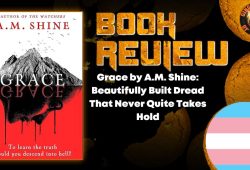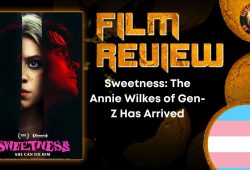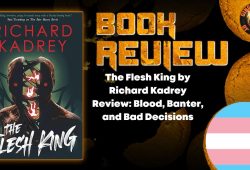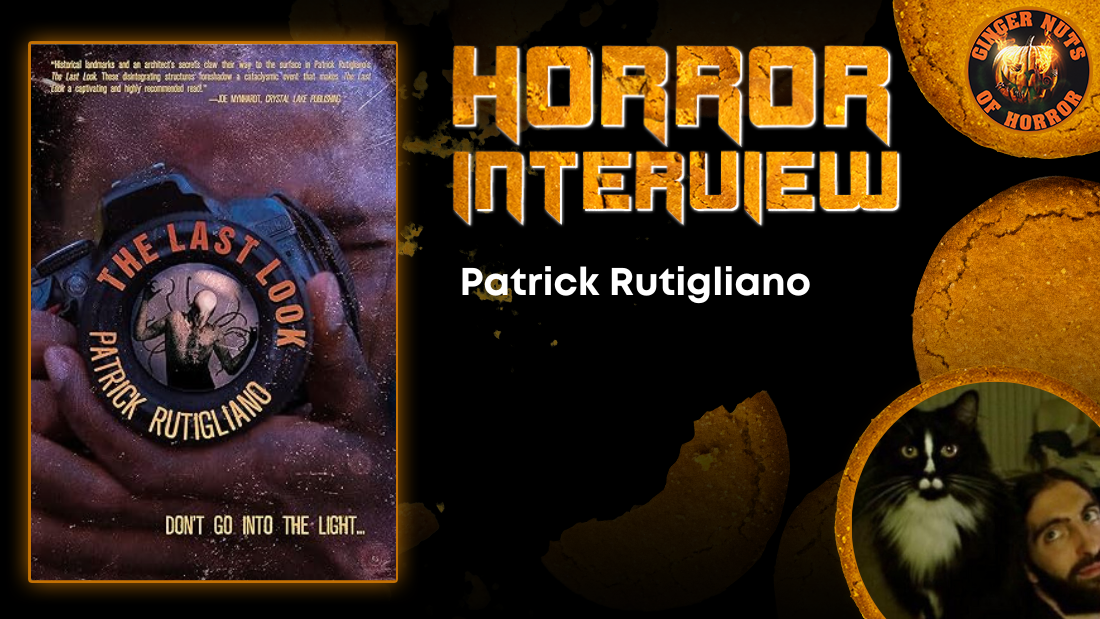Welcome to our interview with Chris W. McGuinness, a former journalist turned horror fiction author known for his unique blend of cosmic horror and Western themes. With his debut novella, Hellbound Bastards, and numerous short stories published in respected magazines and anthologies, Chris shares his thoughts on the horror genre, his writing journey, and the creative forces that inspire him. Join us as we explore his favourite characters, the challenges of writing, and his vision for the future of horror fiction.
Five Minutes with Chris W. McGuinness
Please tell the readers a little bit about yourself.
My name is Chris W. McGuinness. I am a former journalist who now writes horror fiction. I recently published my first novella— a cosmic horror western called Hellbound Bastards— with Alien Buddha Press. My short stories have been published in Chthonic Matter Quarterly, Carnage House, Lovecraftiana Magazine, Fraidy Cat Quarterly, and many other magazines and anthologies. I live and work on California’s Central Coast.
Which one of your characters would you least like to meet in real life?
Hellbound Bastards is full of unsavory characters, but an outlaw named Victor Barnes is one of the meanest of the bunch. I wrote him as sort of a nightmarish, malevolent human predator and let’s just say what happens to him over the course of the book doesn’t make him any less evil or dangerous.
Which of your characters is your favourite?
There’s nothing more fun than writing a good villain. Vernon Calgary, a megalomaniac industrialist and occultist in Hellbound Bastards, really fits the bill perfectly. He’s vain, spiteful, and cunning, all qualities that are enjoyable to take to extremes when you’re writing an antagonist that you hope readers will want to see get what’s coming to them.
Which of your books best represents you?
As my first published novella, I feel like Hellbound Bastards is the culmination of a lot of the writing I’ve done in the first few years of deciding to take my fiction writing seriously. It blends many of the genres I love the most (cosmic horror, historical horror, splatter) and explores themes and concepts that continue to interest and fascinate me. I view it as sort of a mile marker for how far I’ve come in my writing journey and an indication of where I’ll be going next.
Other than the horror genre, what else has significantly influenced your writing?
While I’m a loud and proud horror junkie, I also enjoy reading outside the genre. Fiction-wise, I’m a sucker for beautifully written literary fiction, as well as hard-bitten detective noir and cyberpunk science fiction, all of which pop up in my writing in one form or another. I also can’t resist a great true crime or historical non-fiction read.
The term horror, especially when applied to fiction, always has such heavy connotations. What’s your feeling on the term “horror”, and what do you think we can do to break past these assumptions?
I find it odd that horror tends be confined to the rather limiting box of “just a genre”. To me, it’s also a “tone” or “vibe” that can be applied to all sorts of storytelling. Whereas other genres tend to define themselves by rules that govern what can and cannot be done, horror is at its best when stories twist, bend, and even completely break conventions and expectations. It’s a genre that encourages and rewards transgression, imagination, weirdness, and extremity. This is great because it means the term “horror” can encompass a nearly endless number of story types, but that might be troublesome for anyone seeking to nail down an exact definition of what makes a work horror or not.
Should horror be political?
Horror is innately political whether we want it to be or not. Horror narratives are written in a place and time by human beings with their own thoughts, opinions, and life experiences, all of which are going to have some impact—consciously or unconsciously—on the story. In addition, horror is based on fears and/or anxieties surrounding the violation of cultural, social, religious, and other norms, which again are inherently political acts. The question isn’t really whether horror is political, but how intentional the political elements of a horror narrative are. Is the author/creator trying to make a political point, or is the politics of the narrative simply part of its “background radiation”, so to speak?
Why do you think so many people enjoy horror?
The short answer is that horror is fun as hell. It challenges us to stretch our imaginations to their absolute limits and engage with concepts, ideas, and imagery that we’d otherwise ignore or avoid. It allows us to gaze upon and consider the darkest aspects of human nature and the world around us in a safe, controlled way. In doing so, we can feel a sense of control, or— at the very least— a better understanding of the chaos that surrounds us daily. Horror is a way for us to touch the darkness and danger of existence and be able to claim some small victory over it. This can feel quite thrilling and, occasionally, even empowering.
What, if anything, is currently missing from the horror genre?
I’d like to see more horror centered on protagonists who are blue-collar workers, the working class, and the working poor. I’d like to see more horror with older protagonists. Consider the way a 65-year-old retired construction worker would react to walking into a haunted house or encountering a slasher. I think there’s a lot of interesting stuff to explore there.
What new and upcoming authors should we take notice of?
L.C. von Hessen writes dark, surreal, Ligottiesque horror that really gets under your skin. Go grab their collection Spiritus Ex Machina and give it a read. You will not regret it. Other writers I’m really digging at the moment include Ai Jiang, Rex Burrows, and Patrick Barb.
And who would be on your Mount Rushmore of horror?
Clive Barker, Laird Barron, Joyce Carol Oates, and (of course) Stephen King.
Are there any reviews of your work, positive or negative, that have stayed with you?
Not really any reviews I can think of, but I got a rejection where the editor called my story “exceptionally disturbing”. They meant it in the most complimentary way, and it made my day…maybe even my year.
What aspects of writing do you find the most difficult?
Starting. I love the act of writing, but there’s always a nagging fear that I’m going to sit down at the keyboard, stare at the empty page, and realize I’ve run out of stories to write. But the reality is that is never the case. There are always more stories to tell. Once I get those first couple words down, the doubt and anxiety evaporates and I remember how much fun it is to make up weird, spooky things and write them down for other folks to read.
Does writing energize or exhaust you?
It energizes me. I write very early in the morning before getting ready for my day job, and finishing a nice writing session is a bigger wake-up than multiple cups of coffee. When I go too long without writing, it makes me anxious, grumpy, and even a little depressed. It’s very noticeable. Even my wife can tell when I’ve not been writing.
What’s your best advice for new authors about social media?
Don’t take social media too seriously and only engage with it in a way that is healthy and fun for you. You can drive yourself crazy worrying about building a following or your “brand” as an author, but you’ll probably have a better time if you just post about stuff that interests you, find other folks with similar interests, and/or share dumb memes and jokes. You didn’t get into writing to spend all your time fretting about likes and follows, so don’t sweat it and use social media on your own terms.
How do you balance making demands on the reader with taking care of the reader?
Frankly, this isn’t something I spend a lot of time fretting over. I think the best you can do as a writer is write the story you want and put it out into the world. How the reader reacts to that is mostly out of your hands. I think as writers, we tend to overestimate our ability to predict how a reader will respond to a story. I think it’s better to focus on being as true as you can to your vision. If you are successful in this, the reader will come along with you no matter what demands you make of them.
Writing is not a static process; how have you developed as a writer?
I think I have grown more comfortable writing in my own voice, as opposed to trying to imitate the style of the writers who have influenced me. I have grown less worried about whether I am writing like those I admire, and letting their influence simply be the backdrop to wherever I am in my writing journey now. I’ve also found that I’m more confident in writing stories or narratives that interest me without worrying if they fit into a specific genre, trend, or submission call. I feel a lot less FOMO than I did when I started writing.
What’s the most surprising thing you learned while writing your books?
That I was capable of writing something that I was happy with! I find that, especially when writing longer works like novels or novellas, there always comes a point where I feel I’ve lost the narrative thread and am not at all sure if I will finish the project and if it will be any good. It’s a sort of “pit of despair” I seem to hit at a certain point in the process. But I’ve realized that it will pass if I continue to work toward finishing the story, and I always end up walking away feeling happy with the final result.
What does literary success look like to you?
Literary success can be tricky. It’s easy to constantly move the goalposts and never really be satisfied. For me right now, it would be to simply write and publish more long-form work (novels and novellas) and see them in the hands of readers.
What is the best piece of advice you ever received regarding your writing?
The best and truest writing advice I ever read was this quote from one of my favorite authors, Laird Barron. I’ll let the words speak for themselves here.
“No advice you receive is going to save you from the cold, hard fact that you must square up to the blank page and put the words down the same as everybody else.”
Do you have a favourite line or passage from your work, and would you like to share it with us?
I enjoyed writing the opening of Hellbound Bastards. Here are the first few paragraphs:
A cramped jail cell in Nogales. Year of our Lord 1887.
Leslie McCready sits on a cot. It’s early. The blood-red sun is just a crimson sliver on the horizon outside the cell’s tiny window. He’s never been an early riser, but the noise has kept him awake through the lonely pre-dawn hours.
The pounding of hammers. The rough scrape of saws. He stands and walks to the window, resting his big hands between the bars. The men are still out there. Still building. The gallows are nearly complete. It looks sturdy. The wood is light and fresh and he can smell its green scent on the morning breeze. He counts the steps to the platform and tries to picture himself walking up them. He tries to imagine their hard finality under his boots. Noon will be here before he knows it.
Can you tell us about your last book, and can you tell us about what you are working on next?
Hellbound Bastards is a splattery, gritty tale of cosmic horror set in the Old West. I like to think of it as a mash-up between Sergio Leone and H.P. Lovecraft. I took everything I enjoy about the Western and horror genres and tried to crank them up to 11 in this book.
My next novella is a blend of religious and cosmic horror set in modern day. It’s called Be Not Afraid and tells the story of a teenage altar server and a priest with a troubled past who team up to take on an ancient eldritch entity disguised as a kindly old church lady. Be Not Afraid will be released by Cloaked Press in 2026.
If you could erase one horror cliché, what would be your choice?
I don’t know if I’d erase it, but I’m pretty tired of reading stories where the person is dead or a ghost and doesn’t know it. That twist is stale as a three-year-old bagel at this point.
If your partner was going to leave you for another author, which author would you like them to end up with and why?
My wife already has to endure being married to a writer, I’m not sure I’d be cruel enough to wish her the misfortune of having to put up with yet another one. If I must pick, I’d say go for a writer who makes a lot of money like King, Connelly, or Brown… enjoy the shopping spree, lol!
What’s the one question you wish you would get asked but never do? And what would be the answer?
One question I don’t see asked often is “What is your favorite part of the writing process?”.
My answer would probably be writing the first draft. For some writing, getting that first telling of the story out can be like pulling teeth, but it’s what I look forward to the most. I love sitting down and getting lost while I tell myself a story and try to get that on the page. There’s no better feeling in the world.
Hellbound Bastards by Chris W. McGuinness

There can’t be more than 60 souls of all of Juala, he guesses. Piano music begins to tinkle out from the batwing doors, calling to McCready, but he begrudgingly pushes forward.
Chris W. McGuinness drags you through the dust and blood of Hellbound Bastards, a horror western that kicks like a shotgun blast to the chest. In 1877, outlaw Leslie McCready cheats death in Texas only to find himself in Juala, a remote New Mexican town built to lure something far worse. The Wild Hunt, otherworldly killers bound to a god of chaos, are coming. Pinkerton detective Charlotte Barrett and industrialist occultist Vernon Calgary are preparing for battle. McCready, marked by his past sins, faces a truth even darker than death itself.
McGuinness, a horror writer with credits in Chthonic Matter Quarterly, Lovecraftiana Magazine, and Schlock Webzine, delivers a relentless tale of blood, betrayal, and the abyss staring back. This is horror with the smell of gunpowder in the air and something hungry lurking in the dark.
Ride into Juala if you dare. Just know the Hunt never stops.
Further Reading
If you’re a fan of horror literature and cinema, then you absolutely need to check out the horror interview section of Ginger Nuts of Horror.
Firstly, the interviews feature a diverse range of authors, filmmakers, and horror enthusiasts, allowing readers to gain a multifaceted understanding of the genre. Each interview is an opportunity to explore the creative processes, inspirations, and personal stories behind the minds that produce some of the most chilling and thought-provoking works in horror today. From seasoned veterans to up-and-coming talents, the variety of voices ensures that readers can find something that resonates with them.
Moreover, these interviews often delve into the nuances of what makes horror such a compelling genre. Contributors share their thoughts on the psychological aspects of fear, the societal influences on horror trends, and the ways in which horror reflects cultural anxieties. This deeper exploration not only enriches one’s appreciation for horror stories but also fosters discussions about broader themes, such as identity, morality, and existential dread.
The interviews frequently touch on practical advice and industry insights. Writers and creators often share the hurdles they faced in their careers, tips for aspiring horror writers, and the realities of getting published or produced. This wealth of knowledge is invaluable for anyone looking to navigate the sometimes challenging waters of the horror genre. Readers interested in breaking into horror writing or filmmaking will find a treasure trove of wisdom that could pave their path toward success.
Lastly, the community aspect of Ginger Nuts of Horror cannot be overlooked. Engaging with these interviews allows readers to feel connected to a larger community of horror enthusiasts. Comment sections and social media interactions often follow, enabling fans to discuss their thoughts and engage with both the interviewees and fellow readers.
In conclusion, the horror interview section of Ginger Nuts of Horror is an essential resource for anyone interested in the genre. It provides rich insights, guidance, and inspiration that can deepen one’s appreciation for horror while fostering a vibrant community among fans and creators alike. Don’t miss out on the chance to delve into the minds of your favorite horror creators!









